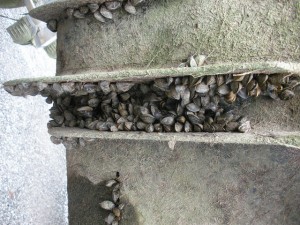Lake Invaders: Zebra Mussels Continue to Spread in North Texas
Before last week, the only positive thing about zebra mussels in Texas was that they lived in just two of the state’s lakes.
But even that’s not the case anymore.
The Texas Parks and Wildlife Department (TPWD) released an emergency order yesterday which enacted special regulations for three new North Texas lakes to control zebra mussels.
Now, boaters that enter Lake Bridgeport, Eagle Mountain Lake, and Lake Worth must completely drain and dry their boats before entering another body of water. The mandate is designed to stop the spread of zebra mussel larvae, which are invisible to the naked eye and can cling to wet surfaces.
Lake Bridgeport joins Lake Texoma, Lake Ray Roberts, and Lewisville Lake on the growing list of lakes that zebra mussels have infested. Although a zebra mussel population has not yet been found in Eagle Mountain Lake or Lake Worth, they were added to the order because they are connected to Lake Bridgeport by the Trinity River.
The map below shows the six lakes which either currently contain zebra mussels or are directly threatened by them. The red pins show lakes that have been infested, and the yellow pins are lakes that are most at risk for infestation.
View Texas Zebra Mussels in a larger map
According to TPWD Inland Fisheries Regional Director Brian Van Zee, the mussels’ spread was practically guaranteed once they entered Lake Ray Roberts, which is on the Elm Fork of the Trinity River.
“The Lake Lewisville [infestation] certainly wasn’t anything you’re real happy or excited to hear about, but it wasn’t completely a surprise either because we knew they were just immediately upstream in Lake Ray Roberts. We kinda anticipated it was just a matter of time,” Van Zee said.
Though the mussels’ spread isn’t a surprise, that won’t lessen their impact. In each of the newly-infested lakes, the zebra mussels threaten to ruin both man-made infrastructure and existing ecosystems. Since there’s practically no way to remove the mussels from these bodies of water, experts can only hope to contain their spread.
But so far, efforts to do that haven’t worked, and Van Zee doesn’t think there’s any reason to be optimistic.
“If they get established in different water bodies, they’re going to be able to migrate by simply spreading downstream,” he said. “You can’t stop the flow of a river, you can’t stop the flow of water across the state. I guess the expectation is there’s a very good likelihood that they will continue to spread across the state.”
And the worst news? You can’t even eat them.
“It would be great if we could say ‘Everybody go harvest them, they’re great for eating,’ but unfortunately that’s not the case,” Van Zee said. “They eat a lot of heavy metals and bacteria, and besides [their diet], they’re so small.”


